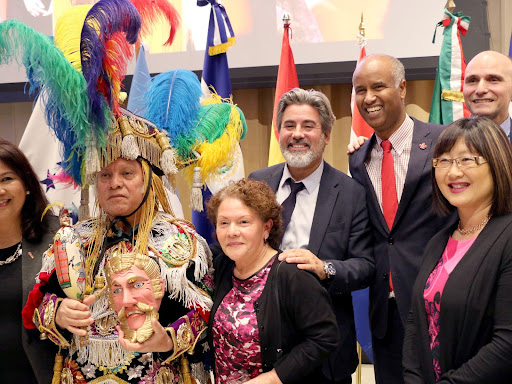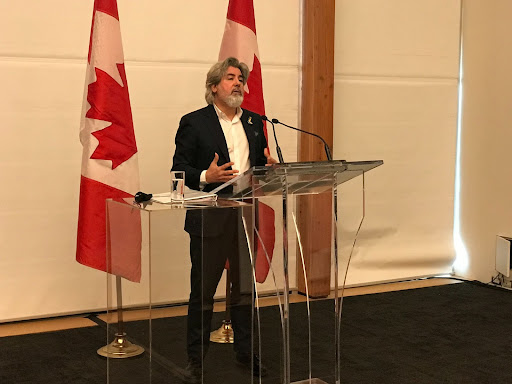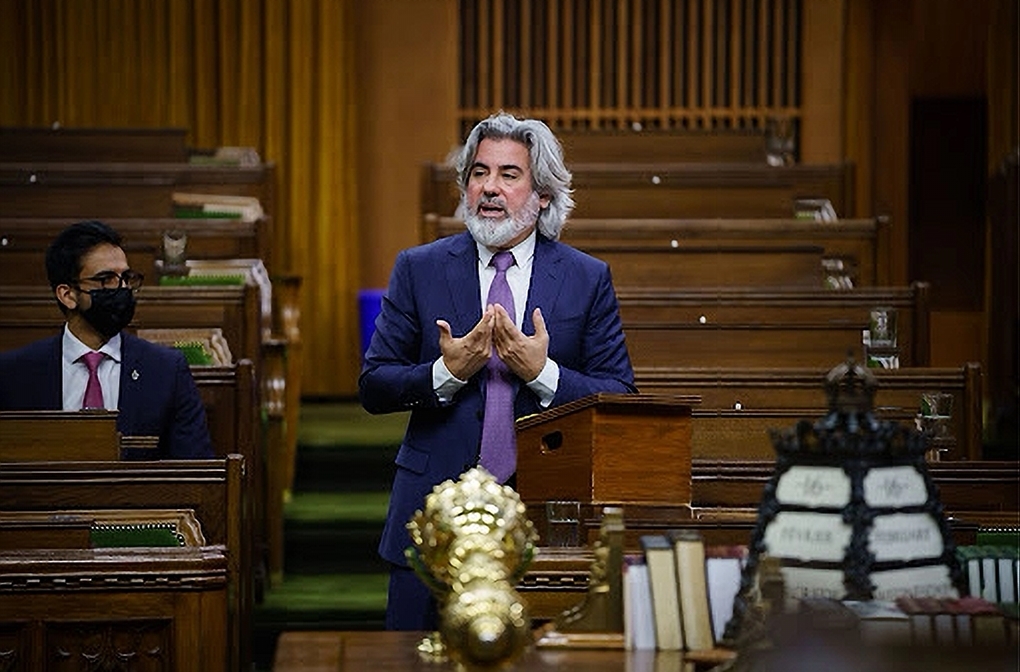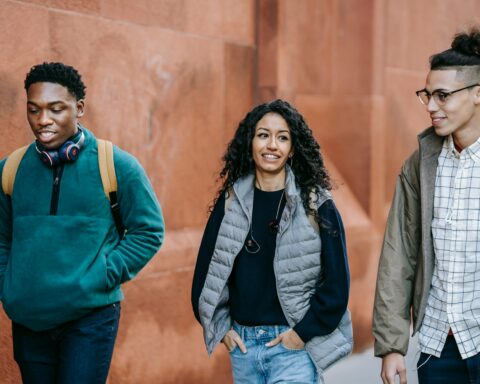Pablo Rodriguez was just eight years old when his family fled to Canada from Argentina after his father had been repeatedly jailed and tortured for his political activism. The year was 1975, just before the South American country fell prey to a civic-military dictatorship that lasted from 1976 to 1983, a period of state-sponsored terrorism known as the Dirty War.
“Never do politics,” Rodriguez recalls his father telling him shortly after arriving in their new country. Fortunately, a young Rodriguez would not heed his father’s advice and soon began associating with politically active youth in Montreal.
By the age of 37, in 2004, Rodriguez became the first elected Latino Member of Parliament for Honoré-Mercier, Quebec. For many years, in fact, he would be the only Liberal representing a riding in eastern Montreal.
In 2018, he made history yet again when he became the first immigrant Latino to be appointed as Minister of Canadian Heritage and Multiculturalism.
However, after almost two decades of parliamentarian work, Rodriguez says he feels “alone,” referring to how little Latino representation there is in the House of Commons.
“I want to see more Latin American immigrants in politics at federal, provincial and municipal levels,” he told New Canadian Media in an exclusive Spanish interview during his visit to Toronto to announce funding to combat digital misinformation.
The Latino politician, who speaks English, French, Spanish and is learning Italian, took the opportunity to send a message to new and young Latino immigrants:
“Mira che (look buddy),” he said using a well-known colloquial friendly phrase, “you’re probably coming from Colombia, Peru, Mexico, but this is your country now, just like those who were born here or who arrived 20 years ago. This is your country, get involved. If you want to see things change, go change them yourself.”
Rodriguez, who has also served as the Leader of the Government in the House of Commons, says there are “very few” Latinos involved in mainstream politics, a contrast against other communities much better politically represented.
Nevertheless, he notes, though it’s not an easy road to take, it’s certainly a possible one.
“When I got here (Canada), I didn’t speak English or French, and now I’m a Minister,” he says.
So, “why not Latinos? That is why I want to help other Latinos.”
The Latin American community in Canada is around 50 years old, with around 700,000 people from Latin, Central and South America spread throughout the country, according to the 2016 Census.
Mauricio Ospina, director of the Canadian Hispanic Business Alliance, argues there are actually “well over a million” Latin-Hispanics in Canada.
“Official statistics are lower due to our own lack of active participation in the Census,” he said in a statement.
And yet, as Rodriguez notes, and despite many Latinos coming from countries mired in political strife, generally speaking, their involvement in Canadian politics is virtually nonexistent.
Strength in diversity
As Heritage Minister, Rodriguez is working to tackle the systemic inequities and disparities that remain present in Canadian society by making sure to appoint as many people from as many different sectors and demographics to boards, and by creating new, more inclusive social programs.
“When I was Heritage Minister for the first time, I created a program against racism. I travelled all over the country to talk with people and understand the reality that they are living; to know how we can help them,” he says, adding that there are many programs offered by the Canadian Heritage Ministry to support immigrants.
Together with Senator Rosa Galvez and Davenport MP Julie Dzerowicz, among others, Rodriguez was also one of the key supporters in Ottawa for the creation of Latin American Heritage Month, which has been happening nationally each October since 2018.

“We are much stronger as a nation through the inclusion of all these immigrants who bring so many different things and who want to participate in this common project called Canada,” says Rodriguez, adding that culture is a “fundamental” value.
As a Member of Parliament, Political Lieutenant of Québec or Minister, Rodriguez is known within the Latino community just as Pablo because of his easy-going and cheerful personality. He’s no stranger to the spotlight either, something he demonstrated in 2019 when he played guitar in front of Parliament Hill for Canada Day.
But perhaps more importantly, he is acutely familiarized with the immigrant and refugee experience.
“Immigrants bring cultural identity,” he says. “And Canada is cultural diversity.”
Funds against disinformation to keep democracy
Rodriguez was in Toronto on March 16 to announce the allocation of $2.5 million to support initiatives that help people identify misinformation and disinformation online.

Framed by Russia’s bloody war against Ukraine and the spread of disinformation, the Digital Citizen Initiative (DCI) will allow Canadians to respond and help in the global efforts to counter misinformation and disinformation.
“We are facing a new global crisis with Russia’s invasion of Ukraine” that represents “a serious threat to democracies in the world,” the Minister said after his announcement at the Art Gallery of Ontario. “Democracy does not happen by itself, we must fight to achieve it and maintain it.”
Rodriguez also said he is considering increasing funds to the Local Journalism Initiative as a way to ensure there is a truly inclusive media ecosystem in Canada. The Local Journalism Initiative supports eligible Canadian media organizations to hire journalists and pay freelancers to produce civic journalism for underserved communities.
He also spoke about upcoming legislation that will force platforms like Facebook and Google to contribute to Canadian journalism, including so-called ethnic outlets.
Much of the Spanish-speaking community consider Rodriguez a political role model to follow, which in turn has been motivating more Latinos to run for office. Indeed, in recent federal and provincial elections, more Latino names — usually of women — have been added to the candidates’ list.
Rodriguez is humbled by the support, recognizing it is a “privilege” to serve. But while the road to inclusive representation remains long, he adds, it need not remain lonely as well.
“We need more input from immigrants, and the Canadian Heritage (Ministry) is there to support that,” he says.
“I am a Minister, and it is a privilege, but I would like there to be more Latinos around this table so that we make decisions that consider who we are and how we can contribute to this country.”
Editor’s note: a previous version of this article published March 22 referred to incorrect legislation relating to global digital platforms
Isabel Inclan has worked as a journalist for more than 20 years, in both Mexico and Canada. She began working as a foreign correspondent in Canada in 1999 for Mexican media. She has been a New Canadian Media contributor since 2018. Her main areas of interest are politics, migration, women, community, and cultural issues. In 2015, Isabel was honoured as one of the “10 most influential Hispanic Canadians.” She is a graduate of Masters in Communication and Culture at TMU-York University. She is a member of CAJ and a member of the BEMC´s Advisory Committee.





